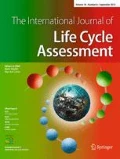Abstract
There are different ways and strategies to reduce the environmental impacts caused today. One starting point for reducing the environmental impacts of today is the private consumption. Finally, all goods and services provided in a country contribute to fulfil the needs and demands of consumers. Several national and international initiatives therefore aim for a considerable reduction of the environmental impacts of consumption patterns. The 49th LCA Discussion Forum analysed the present consumption patterns of households and their consequent environmental impacts. Based on this, potentials for a reduction of the environmental impacts were identified and discussed. In this context, the possible applications, advantages and drawbacks of the life cycle assessment (LCA) methodology were analysed. National and international speakers provided qualified insights on the topic. The 49th Discussion Forum concentrated on different aspects of sustainable consumption patterns. The focus lay on private households and the environmental impacts caused by their consumption patterns. In the first session, the idea of the “2000-Watt society” was introduced as an example of a concept of a “sustainable lifestyle”. Another way of analysing the total impacts is the consumption perspective introduced in a second presentation. Based on an analysis of environmental impacts due to final demand of Swiss households, different measures for a reduction of environmental impacts were proposed and analysed. The second session examined similar activities in Germany. The short presentations covered the communication of LCA results. The third session focused on web-based eco-calculators. In the last session, two scientific inputs were given on the modelling of household consumption patterns and on the impact of rebound effects on the environmental impact of private consumption. The most important consumption domains are nutrition, mobility and energy use in households. Apart from different modelling approaches and boundary conditions, the majority of the presentations showed that today’s consumption patterns in Switzerland and Germany are far away from a sustainable level. Considerable reduction measures are needed in order to reach this goal. Eco-calculators and similar tools provide an effective way to raise customer awareness. In general, it is very important to communicate LCA results in a simple, clear and transparent way.
References
Bundesamt für Energie (2012) Energiestrategie 2050—Bericht des Teilprojekts Energienetze und Ausbaukosten, Bern
Frischknecht R, Steiner R, Jungbluth N (2009) The ecological scarcity methzd—eco-factors 2006: a method for impact assessment in LCA. Federal Office for the Environment FOEN, Zürich und Bern. www.bafu.admin.ch/publikationen/publikation/01031/index.html?lang=en
Girod B (2009) Integration of rebound effects into LCA—analysis of the environmental impact of product-consumption interactions. Swiss Federal Institute of Technology (ETH), Zurich
Jungbluth N, Nathani C, Stucki M, Leuenberger M (2011) Environmental impacts of Swiss consumption and production: a combination of input–output analysis with life cycle assessment. Environmental studies no. 1111. ESU-services Ltd. & Rütter + Partner, commissioned by the Swiss Federal Office for the Environment (FOEN), Bern, CH. www.esu-services.ch/projects/ioa/ or www.umwelt-schweiz.ch
Jungbluth N, Itten R, Schori S (2012) Environmental impacts of food consumption and its reduction potentials. In: Proceedings from the 8th International Conference on LCA in the Agri-Food Sector, Rennes, France, 2–4 October 2012
Kesselring and Winter (1994) Szenarienanalyse in Richtung einer 2000 W Gesellschaft CH
Palmedo PF, Nathans R, Beardsworth E, Hale SJ (1978) Energy needs, uses and resources in developing countries. Brookhaven National Laboratory, New York
Saner D, Jäggi B, Waraich R, Heeren N, Hellweg S (2012) Housing and mobility demands of individual households and their life cycle asssessment (in submission)
Schächtele K, Hertle H (2007) Die CO2 Bilanz des Bürgers. In: Berichte (ed. Umweltbundesamt). IFEU, Berlin. www.umweltbundesamt.de/uba-info-medien/dateien/3327.htm
Acknowledgments
We thank the speakers for their interesting contributions to this Discussion Forum.
Author information
Authors and Affiliations
Corresponding author
Rights and permissions
About this article
Cite this article
Flury, K., Jungbluth, N. 49th Discussion forum on LCA—sustainable consumption patterns—September 18, 2012, Zurich, Switzerland. Int J Life Cycle Assess 18, 529–534 (2013). https://doi.org/10.1007/s11367-012-0530-8
Received:
Accepted:
Published:
Issue Date:
DOI: https://doi.org/10.1007/s11367-012-0530-8

